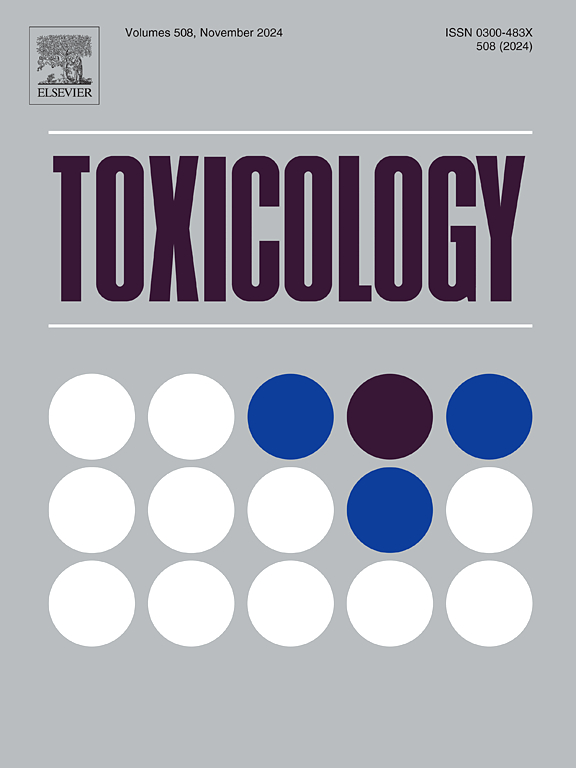鬼臼毒素诱导的肠道毒性机制:肠道微生物群、短链脂肪酸和炎症介质的多组学整合
IF 4.6
3区 医学
Q1 PHARMACOLOGY & PHARMACY
引用次数: 0
摘要
鬼臼毒素(Podophyllotoxin, PPT)是一种从鬼臼根和茎中提取的木脂素,具有明显的肠毒性,限制了其临床应用。然而,其潜在机制尚不清楚。本研究旨在阐明ppt诱导肠毒性的机制。评估体重、粪便形态、毒性表型和组织病理学特征的变化。进行3D重建、16S rRNA测序、靶向短链脂肪酸(SCFAs)分析和炎症细胞因子检测。结果表明,PPT引起了大鼠的病理改变,包括体重减轻、腹泻和结肠损伤。PPT给药显著减少了乳酸菌等有益菌,同时增加了埃希氏志贺氏菌等有害菌。细菌侵袭上皮细胞和脂多糖生物合成的预测途径显著上调。促炎细胞因子,包括肿瘤坏死因子-α (TNF-α)和白细胞介素-6 (IL-6)水平也升高。此外,十一烯丙基二磷酸合成酶(UPPS)的表达和SCFAs的产生也减少。这些结果表明,PPT可能改变肠道微生物组成,增加肠上皮细胞内志贺氏杆菌的侵袭,促进脂多糖的产生,增强促炎细胞因子(包括TNF-α和IL-6)的释放,抑制UPPS的表达和SCFAs的产生,共同参与肠毒性。本研究对PPT致肠毒性的机制提供了新的见解,这对预防和治疗PPT毒性至关重要。本文章由计算机程序翻译,如有差异,请以英文原文为准。
Mechanisms of podophyllotoxin-induced enterotoxicity: A multi-omics integration of gut microbiota, short-chain fatty acids, and inflammatory mediators
Podophyllotoxin (PPT), a lignan extracted from the roots and stems of Podophyllum species, exhibits significant enterotoxicity that limits its clinical application. However, its underlying mechanisms remain unclear. This study aimed to elucidate the mechanisms underlying PPT-induced enterotoxicity. Changes in body weight, fecal morphology, toxic phenotypes, and histopathological features were evaluated. 3D reconstruction, 16S rRNA sequencing, targeted short-chain fatty acids (SCFAs) analysis, and inflammatory cytokine assays were performed. The findings demonstrated that PPT induced pathological changes in rats, including weight loss, diarrhea, and colonic damage. PPT administration significantly reduced beneficial bacteria such as Lactobacillus, while increasing harmful bacteria such as Escherichia-Shigella. The predicted pathways of bacterial invasion of epithelial cells and lipopolysaccharide biosynthesis were significantly upregulated. Levels of pro-inflammatory cytokines, including tumor necrosis factor-alpha (TNF-α) and interleukin-6 (IL-6), were also increased. Additionally, the expression of undecaprenyl-diphosphate synthase (UPPS) and SCFAs production was reduced. These findings indicate that PPT may alter gut microbial composition, increase Escherichia-Shigella invasion in the intestinal epithelial cells, promote lipopolysaccharide production, enhance the release of pro-inflammatory cytokines, including TNF-α and IL-6, and inhibit UPPS expression and SCFAs generation, collectively contributing to enterotoxicity. This study provides novel insights into the mechanisms behind PPT-induced enterotoxicity, which is essential for preventing and treating PPT toxicity.
求助全文
通过发布文献求助,成功后即可免费获取论文全文。
去求助
来源期刊

Toxicology
医学-毒理学
CiteScore
7.80
自引率
4.40%
发文量
222
审稿时长
23 days
期刊介绍:
Toxicology is an international, peer-reviewed journal that publishes only the highest quality original scientific research and critical reviews describing hypothesis-based investigations into mechanisms of toxicity associated with exposures to xenobiotic chemicals, particularly as it relates to human health. In this respect "mechanisms" is defined on both the macro (e.g. physiological, biological, kinetic, species, sex, etc.) and molecular (genomic, transcriptomic, metabolic, etc.) scale. Emphasis is placed on findings that identify novel hazards and that can be extrapolated to exposures and mechanisms that are relevant to estimating human risk. Toxicology also publishes brief communications, personal commentaries and opinion articles, as well as concise expert reviews on contemporary topics. All research and review articles published in Toxicology are subject to rigorous peer review. Authors are asked to contact the Editor-in-Chief prior to submitting review articles or commentaries for consideration for publication in Toxicology.
 求助内容:
求助内容: 应助结果提醒方式:
应助结果提醒方式:


